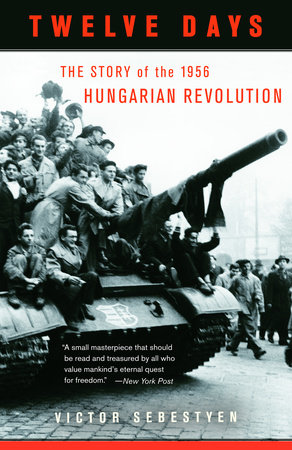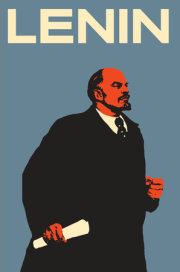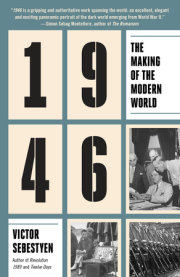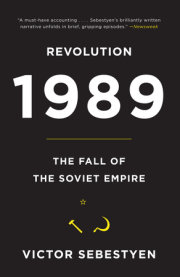ONE
9 October 1944, Moscow
In his apartment in the Kremlin, Joseph Stalin hosted a war summit with Winston Churchill. Both men knew it was only a matter of months before Germany would be defeated. They wanted an understanding about the future of Europe after the conflict ceased.
Much to the annoyance of the British Prime Minster, who kept slightly more conventional hours, Stalin slept during the day and worked at night. The leaders met at 10 p.m., with only their Foreign Ministers, Vyacheslav Molotov and Anthony Eden, and two interpreters present. Churchill later described the scene: 'The moment was apt for business so I said "Let us settle our affairs in the Balkans. Your armies are in Romania and Bulgaria. We have interests, missions, agents there. Don't let us get at cross purposes in small ways. So far as Britain and Russia are concerned how would it do for you to have 90 per cent predominance in Romania, for us to have 90 per cent of the say in Greece and go 50/50 about Yugoslavia?"'
Churchill picked up some paper and wrote down on a half-sheet the deal he proposed. 'Hungary was another country to be split 50/50. Casting an eye over the paper, Stalin took his blue pencil and made a large tick upon it and passed it back to us. It was all settled in no more time than it takes to set down. After this there was a long silence. The pencilled paper lay in the centre of the table. At length I said "Might it not be thought rather cynical if it seemed we had disposed of these issues, so fateful to millions of people, in such an offhand manner? Let us burn the paper?" "No, you keep it," said Stalin.' The next day Soviet troops crossed the border from Ukraine into eastern Hungary and they did not leave for a further forty-five years.
Diplomats and historians still argue about the significance of the 'percentage deal', or as Churchill called it, 'the naughty document'. Many say it was unimportant and simply recognised the reality of Russian troops on the ground. But taken together with US agreement at the Yalta Conference the following year, the post-war division of Europe had a massive psychological effect in Hungary. 'After the war we felt abandoned by the West,' Eva Walko, a well-informed and astute young woman who had travelled widely in the west between the wars noted. 'And our feeling proved to be right.' Eden minuted his Permanent Secretary, Alexander Cadogan, after the 'percentage deal' was struck: 'I expect the Russians will want to be very hard on the Hungarians.' He was a master of understatement.
First, though, the Russians had to win their victory. The next six months in Hungary saw some of the most bitter
ghting of the entire war. Two Soviet armies commanded by Marshal Rodion Malinowsky slowly encircled Budapest, while in the capital itself there was chaos and civil war.
Hungary, under its 'Regent' for the last quarter of a century, Admiral Miklo´s Horthy, had been a key ally of the Germans.* Horthy's manners were impeccable, but he was ruthless and violent. Thousands of his opponents were murdered or disappeared. His primary aim was simple: to win the return of historic Hungarian lands lost after the First World War. Hitler had promised to restore to Hungary most of Transylvania, Slovakia and Croatia, which had been ceded under the Treaty of Trianon. From the mid 1930s, with Horthy's blessing, Hungary became increasingly Nazi
ed, and when the time came the Regent's army enthusiastically marched against Soviet Russia.
Hungarians escaped the worst of the war until March 1944, when the Germans occupied the country. They were desperate to bolster the steadily weakening Eastern Front and they wanted to make up for lost time in implementing the Final Solution in Central Europe. In barely six months 450,000 Hungarian Jews, those living outside Budapest, were sent to the gas chambers in Auschwitz-Birkenau. Even if Horthy had wanted to save them - and the evidence is mixed, his private papers reveal him as a keen anti-Semite - he could do nothing.
In September 1944 the Regent at last tried to do the decent thing. Knowing the Germans would lose the war, he made secret overtures to Stalin about a separate Hungarian-Soviet peace. His attempt never came to anything. The Germans got wind of the plans. Commandos kidnapped his surviving son, Miklo´s junior, and on 15 October forced the Regent to abdicate. He was deported to Germany. Hitler replaced him as head of state with Ferenc Sza´lasi, the leader of the Arrow Cross, Hungary's home-grown fascist group, who unleashed an unprecedented reign of terror and destruction on the country that shocked even the German High Command by its barbarity. The transports to the death camps had stopped in the summer. But the Arrow Cross continued the slaughter. Its gangs roamed Budapest rounding up Jews and anyone suspected of socialist sympathies. Scores of thousands were shot on the Danube quayside and thrown into the river.
As Malinowsky's troops tightened the circle around Budapest, the defeat of Hungary was an imminent prospect celebrated in anticipation by the Western allies. Unlike Poland or Czechoslovakia, Hungary was not then seen as a plucky little victim nation. Propaganda from London, Washington and Moscow remembered that the Hungarians had been on the 'wrong' side in two world wars and judged them to be among the chief troublemakers in Central Europe. The view of the Tory MP and diarist Harold Nicolson, a man of liberal opinions, was common at the time:
When I learned that the Russian armies were within cannon-range of Budapest, I was conscious of delight, which I felt to be neither virtuous nor sane. My reason tells me that the Hungarians found themselves in a dificult position, and that it would have been hard indeed for them to maintain a stubborn neutrality. They were forced into the war by geographical necessity and by a burning resentment against the Treaty of Trianon. The fact is that since the day more than a thousand years ago, when Árpád first entered Hungary, the Magyars have done much harm and little good to Europe . . . My satisfaction may be due to the quite rational feeling that this time the Hungarians will not again be able to disturb the peace.
The bloody siege of Budapest began on Christmas Eve and lasted fifty-one days. The Germans had transferred ten divisions to Hungary from the Western Front and Hitler's orders were to defend the city at all costs. More than 40,000 German troops and 70,000 Russians died in the battle, large numbers in hand-to-hand combat. Uncounted thousands of civilians, hiding in basements, were killed in the cross fire. At the end Budapest lay in ruins. All the bridges spanning the two sides of the Danube had been blown up by the retreating Germans. After Berlin and Warsaw, Budapest was the most war-ravaged capital in Europe. Ferenc Nagy,* shortly to become Prime Minister, described the sight as he came out of his hiding place on 14 February 1945: 'Manhigh rubble covered the streets. High blockades of concrete, steel girders, lumber, brick and glass from the collapsed buildings jammed the thoroughfares. The wrecks of thousands of planes, tanks, armoured cars were everywhere . . . Merciful snow covered the uncounted dead. Animal carcasses littered the streets. Shop windows were full of the dead, while the wraith-like living ransacked the abandoned stores. Twisted tram rails jutted skyward like thin fingers of an imploring hand.'
For a few days of joy the Russians were greeted rapturously as saviours. But the frontline army moved on for the
nal assault on Germany, leaving behind soldiers who made Hungarians understand very quickly what it meant to be a conquered enemy. The Red Army's occupation caused despair even among those who welcomed it as the defeat of fascism. Soon, hatred of the Soviet Union became stronger than before the defeat. The first Russian words most Hungarians learned was the phrase 'Davai tchassey' ('Give me your watch'). Looting was widespread, from of
cially sanctioned 'trophy brigades' which sought valuables that were sent back to Moscow, to soldiers emptying food stores.
The great novelist Sándor Márai had his belongings stripped, as did many of his friends:
The Russian who dropped by in the morning, conversed amicably with the family, showed pictures of his wife and children back home, sentimentally patted the heads of the children and gave them candy, departed and then returned in the afternoon or late at night and robbed the very same family he had made friends with that morning . . . the looting was not aimed at the 'fascist enemy' but caused simply by abject poverty. These Communist Russians were so impoverished, so miserably destitute, so completely stripped of everything . . . that now, set loose after 30 years of privation and drudgery, they threw themselves hungrily on everything that fell into their hands.
That included women. For more than four decades, until Soviet troops left Hungary in 1990, almost nobody dared mention the taboo subject of the rapes committed by Russian soldiers in 1945. Many victims would not talk about it in their own families or with friends, let alone in public. It is still not known exactly how many women were raped, but a report made by the Swiss Embassy at the time, kept secret for many years, made a rough estimate of around 150,000 (from a female population of about 4.5 million). As a direct result the abortion laws were liberalised so that women could terminate unwanted pregnancies.
Women were attacked from day one of the liberation, as Christine Arnothy, a fifteen-year-old girl emerging with her sister Ilas from a Budapest cellar, recalled: 'The Russians were advancing and . . . at each house, a group of soldiers left the main body . . . One detachment entered our house. The officer who commanded it yelled at us to know if there were any Germans in the house. Several of us nodded in the direction of the staircase. The German was killed on the spot and Ilas, whom they had found close to this wounded man, was raped beside the still warm corpse. From the
rst instant we understood that what was happening was very different from what we had hoped.'
Alaine Polcz, in her early twenties at the war's end, had been a prisoner of the Germans. When the Russians reached her village in eastern Hungary she was effectively held prisoner again. Soviet troops had seen a picture of her with her husband. He was an officer in the Hungarian army, so they arrested her. She was held with a group of other women in a church presbytery near the front line, where she could hear constant gun fire. Years later she remembered her ordeal. 'Earlier on in the war I had seen those posters in Budapest showing a Russian soldier tearing a cruci
x off a woman's neck and I'd read pamphlets saying that the Russians did this and that. I didn't believe any of it. Propaganda I thought.' Soon she learned differently. She saw a young girl whose head was bleeding - a lock of her hair had been torn out. She was miserable and desperate.
'The Russians rode her,' said her mother. I didn't understand. 'With a bicycle?' I asked. The woman became angry. 'Are you a fool? Don't you know what they do to women?'
The next day Ms Polcz was in a room with her mother-in-law:
In came three Russians and told me to go with them. Now I knew exactly what they wanted. I put on my boots and tied my headscarf, then I untied it and tied it again, then I untied it once again to gain some time. As I stood there I heard something knocking on the door; it was the heels of my boots, I was trembling so much.
We stepped out into an L-shaped corridor. I started to attack them wildly . . . kicked and hit them with all my strength, but the next moment I was on the ground. No one made a sound. We fought in silence. They took me to the kitchen at the back of the house and as I tried to defend myself they flung me down so that I hit my head against the corner of the rubbish bin. It was made of hard wood.
I came round in the priest's big room. The window panes were broken, the windows were boarded up. There was nothing on the bed but bare boards on which I was lying. A Russian was on top of me . . . The feeling in my body hadn't returned with my consciousness; it was as if I was numb or gone cold . . . In that windowless unheated room I was naked from the waist down. I don't know how many Russians used me after that, or how many there had been before. As dawn was breaking they left me. I got up. I could only move with great difficulty. My head and my whole body ached. I was bleeding profusely. Over the next few days new troops arrived and I was pestered a lot.
She was infected with syphilis from the repeated rapes.
Men who tried to protect women were viciously brushed aside, or killed. The best-known case was Bishop Vilmos Apor, from the western Hungarian town of Gyor, who had bravely opposed the persecution of the Jews. On Good Friday 1945 drunken Soviet soldiers entered his palace in search of a group of young women they had seen going in through a side entrance. When the soldiers went down to the cellar they saw the Bishop in full ceremonial regalia blocking the entrance to the room where the women had sought refuge. He tried to wrestle with the intruders, but they shot him three times. Bishop Apor died two days later on Easter Sunday.
For many Hungarians 'official looting', as they referred to war reparations paid to Russia after the post-war peace settlements, seemed as bad as the pillaging by soldiers. 'We have had three great tragedies in Hungary - the Tartar conquest in the thirteenth century, the 150year Turkish occupation - and the Soviet liberation,' a well-rehearsed saying of the time went. The division of Europe and the punitive damages awarded against Hungary in the Yalta and Potsdam agreements were resented almost as much as the Versailles and Trianon treaties had been a generation earlier after the First World War. 'The victorious country demands us to assert its rights for the reason that the vanquished country started war against it,' Vladimir Dekanozov, the Soviet Union's Foreign Affairs Deputy Commissar, explained bluntly on an early visit to Budapest.
Copyright © 2007 by Victor Sebestyen. All rights reserved. No part of this excerpt may be reproduced or reprinted without permission in writing from the publisher.








